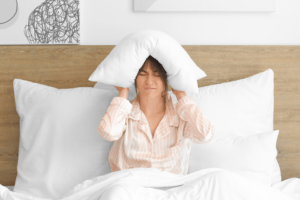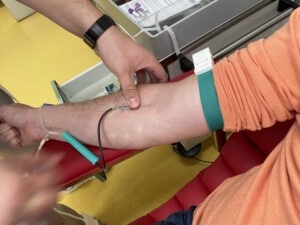
Getting enough shut-eye can be tricky, especially if you’re in planning mode ahead of the upcoming holidays. From decorating to gift shopping, there’s always something to do. But missing out on sleep can make you feel drowsy, irritable, and drained.
Sure, you can take a nap to compensate or sleep in on the weekends — but be warned, science suggests that sleep deprivation has severe long-term effects. In fact, new research explores how a lack of rest can lead to a greater risk of inflammation and disease.
A recent study on sleep and inflammation published in the Journal of Experimental Medicine examined the outcome of disruptions in sleep patterns on immune and inflammatory responses. The study included 14 adults (average age of 35) who consistently got adequate rest and didn’t report having any sleep disorders. In the study’s first phase, researchers tracked participants sleeping eight hours a night for six weeks. Blood and immune cell samples were collected after participants completed this phase. In the next phase, the same participants reduced their sleeping time by 90 minutes each night for six weeks. Rest was monitored through a wrist-actigraphy device and nightly sleep diaries. Researchers collected blood and immune cell samples following this period and compared them with samples from the first phase. The findings were two-fold: 1) sleep loss increased levels of immune cells (white blood cells) in all participants; 2) sleep loss altered the DNA structure of the immune cells. High white blood cell counts are proven triggers of inflammation, which can result in developing diseases such as cancer and heart disease.
The authors conducted a second, similar experiment on two groups of mice. For 16 weeks, a control group slept undisturbed, while the trial group was woken up throughout the night. (This is known as sleep fragmentation).
After the 16 weeks, the sleep fragmentation group underwent a recovery period wherein they slept uninterrupted for 10 weeks, mimicking the control group’s sleeping pattern in the initial 16-week phase of the experiment. Immune stem cells and immune cells were collected from both groups of mice throughout the experiment.
Analyzing and comparing the cells throughout the experiment affirmed researchers’ initial hypothesis: Fragmented sleep increased the number of immune cells in the trial group mice, even after they completed the sleep recovery phase. Additionally, these cells were rewired and reprogrammed, producing greater numbers of white cells and making the mice prone to inflammation and disease.
In a press release, lead author Filip Swirski, Ph.D., highlighted the danger of excess immune cells due to a lack of sleep. “[The study shows] that in humans and mice, disrupted sleep has a profound influence on the programming of immune cells and rate of their production, causing them to lose their protective effects and actually make infections worse — and these changes are long-lasting,” Dr. Swirski says.
Limitations of This Research
One limitation of this study is that there were only 14 adults participating. A small participant pool can decrease a study’s statistical power. However, the findings from this study resemble previous observations from Harvard Medical School scientists noting how sleep deprivation increases inflammation risk.
The average age of participants is also worth noting, as the likelihood of developing sleep disorders heightens with age. In the experiment, the average age was 35, which could explain why it required purposely interrupting the participants’ sleeping pattern. Overall, this research provides food for thought as to how sleep affects your overall health.
“This work emphasizes the importance of adults consistently sleeping seven to eight hours a day to help prevent inflammation and disease, especially for those with underlying medical conditions,” Dr. Swirski stated in the press release.
What This Means For You
If you’re not catching Zzz’s with ease, it’s time for a change. Consider a new mattress or upgrade your pillow. You can also try ditching soda and sugary drinks in the evening and brewing yourself a cup of herbal tea, or limiting your screen time to prevent blue light exposure from hindering your rest. Ultimately, making the necessary adjustments to your bedtime routine promotes healthier sleep — which may in turn keep inflammation and disease risk at bay!





































